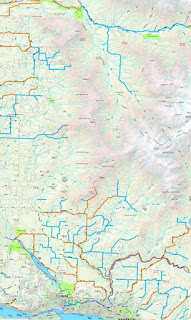originally posted 10-21-2016
 |
| Snow on ground at 850 feet, no snow in Vancouver on this day |
Here in Clark County we have many neighborhoods scattered throughout the Cascade foothills. Some subdivisions have houses bumping right up against 2000 feet above sea level. In general once you get up above 1000 feet, winter weather is more... well... wintry. Sellers need to be aware that selling property in the foothills up higher than a 1000 feet is not going to produce many showings during the winter months. It is important to maximize the showings by following good showing tactics. Keep the home warm and bright and keep snow clear of the walkways and driveway. But capitalize on winter themes. Often buyers looking up in the mountains during the winter want to have real winter weather. Keep that fireplace stoked and feel free to build a snowman!
Down in the valleys of Vancouver and Portland snowfall is far less common than rain. Locally Vancouver averages about 6 inches a year at Pearson field. But averages are deceiving. There are years that have no snow at all and others that have heaping amounts. Meanwhile, up in the mountains things are more defined. Above a thousand feet it is not a case of if it snows, but rather, how much snow will there be.
Buyers should keep this in mind as well. Many people are looking for a rural home on some acreage. As one moves east generally things start to climb in elevation. Clark County's entire eastern flank is the Cascades with elevations rising up to about 4000 feet before spilling into Skamania County.
When seeking a home up at elevations in the 1000-2000 range which is about as high as you'll find a home in the county, there are a few things to consider. Most higher elevations above 2000 feet are part of the Washington State DNR or the Gifford Pinchot National Forest which do not contain developed neighborhoods.
 |
| East County Snow Routes |
Since those monster events are so rare, the county keeps a modest amount of equipment for winter snow removal. Usually most snow events are well handled by the county crews. Those 'snowzilla' events however, will leave the roads snow covered and dangerous. The primary and secondary routes are important if home buyers do not wish to traverse hard-packed, snow-covered roads on a regular basis. Clark County has a published chart showing the snow removal routes for rural areas.
Consider carefully properties that are more than a quarter to half a mile off one of these snow removal routes as travel can be perilous in the mountains when it snows. Remember it may be raining in Vancouver and snowing up in the foothills.
Additional families with school age children should consider school district rules for snow. Generally a wide spread snow event with even modest amounts of snow can trigger a school closure. For mountain dwellers however there will be many days in which schools remain open because it's raining in the valleys and snowing up high. On those days, school buses often run special "snow routes". These will keep buses off the steep terrain and require that parents get the kids to the snow route bus stop on their own. These are things to consider when buying a home above 1000 feet.
It should be noted that most of the time areas between 800-1200 feet don't get huge amounts of snow all at once unless it's during one of the every five years 'snowzilla' event. What happens up around 800-1200 feet is that there is simply more snowy days. 1-2 inches in Vancouver might equate to 3-5 inches at 1000 feet. But there will be 3 to 4 times as many snowy days and as the elevation rises so rises the number of times per year snow falls. Also up above 1000 feet the snow tends to stick around longer than it does down in the valleys.
I would like to note that none of Clark County's incorporated urban areas exceed 800 feet in elevation. The high spot is probably Prune Hill in Camas at just under 800 feet. It is the rural country areas in the Cascade foothills that can be up close to 2000 feet. Buyers worried about snow but looking at traditional suburban or urban neighborhoods need not worry about heavy snow outside of the rare events.

No comments:
Post a Comment